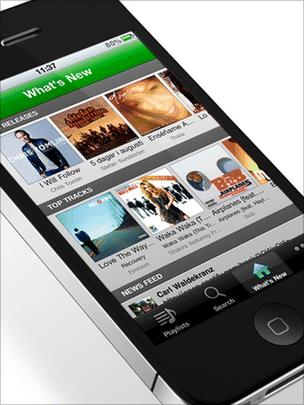Spotify heads West to the US...finally
- Published
- comments

Finally - the streaming music service Spotify is launching in the United States.
It's taken years of painful negotiations with the record labels, and there've been many false alarms, when it appeared the launch was imminent, only for it to be postponed again.
But this could be an important day for Spotify, for the digital music industry - and for the European technology scene.
Daniel Ek, the firm's Swedish founder, spent two years on planes across Europe sorting out the licensing deals which made it possible to launch the original service.
He's probably accumulated a lot more airmiles in getting the American music industry to come to the party. This afternoon, on the phone from the West Coast, he told me about the deal.
"It's taken longer than I would have wished," he admitted.
So why was it so hard?
"Spotify is a very different model to what they're used to - you get paid every time you get played. It's a whole new concept for the music industry.
"There has been a healthy scepticism about whether this will work and should we bet the farm on this."
But, finally, the success of that model in Europe had convinced executives in the United States that it was worth trying.
It all illustrates the mixed feelings industry executives have had about Spotify, right from the start.
Tribute act
On the one hand they point to it as evidence that there is now a legal alternative for the download generation, on the other they gripe about the miniscule returns it gives to artists.
A record industry executive told me recently that while he was keen for all of his artists to be available on Spotify, individual managers sometimes refused, convinced that it would cannibalise CD sales.

Founders Daniel Ek (L) and Martin Lorentzon (R)
Daniel Ek says the idea that artists make just pennies from his service is a totally wrong - and he cites his home country as an example.
"The truth today is that the vast majority of income for Swedish artists comes from us. " And he points to figures from the IFPI trade body showing that Spotify is now the second biggest earner of digital revenues for the industry.
Now at last a service which has attracted 1.6 million paying customers in Europe can attack the American market.
It has some things going for it - most notably support from a major technology celebrity.
Facebook's Mark Zuckerberg has been talking excitedly about Spotify for a couple of years - according to this story, external he even updated his Facebook status to "Spotify is so good".
And then there's Britney Spears, who tweeted last night, external: "So excited Spotify is FINALLY coming to the US tomorrow! Getting my playlists ready now...".
For Daniel Ek, it's that kind of endorsement that is really valuable: "When artists like Britney and others speak about it that means the most to me, because if they're excited about the product that gets me really happy. For me it's about how to create a win-win between artists and fans who want to enjoy their music."
Eyes on the prize
But arriving so late in the US means that the newcomer will find a market where digital music consumers already have plenty of choice, from Pandora to last.fm, from Rdio to Rhapsody.
Persuading them to try something new will be tough, even if as Spotify claims it will provide a much wider offering at a better price than is currently available.
The trick will be to attract enough users in the early days with the promise of free music, then persuade them to upgrade to the ad-free subscription option.
The price of a subscription - $4.99 or $9.99 with mobile use thrown in - has been set lower than it is in Europe. The record companies really don't like the idea of free music - so presumably the tortured negotiations have centred around just how much will be given away for how long.
The margins in this business are going to be wafer thin, so Spotify cannot afford to be a minor player in the US market - it's got to do what it has achieved in Europe and prove that millions are prepared to pay for access to music.
At times in recent months when the negotiations in the US seemed to be going badly, Spotify has insisted that it could perfectly well carry on without entering the American market.
Daniel Ek still says it's not essential for the business, claiming his real motivation is just to help people share, discover and consume music and "we don't want to leave out the world's largest music market".
I'm not sure his investors will see it quite the same way.
A business with a valuation of around a billion dollars needs to keep moving forward.
From the Beatles to Adele, artists from this side of the Atlantic have shown that breaking into America is still the yardstick of lasting success.
Now Spotify needs to show that Europe can produce a hit that American music fans will buy.